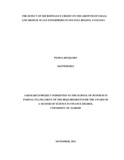| dc.description.abstract | Small and Medium Scale Enterprises play an important role in the Economic
Development of both developed and developing nations. Microfinance is defined as a
development tool that grants or provides financial services and products such as very
small loans, savings, micro-leasing, micro-insurance and money transfer to assist the very
or exceptionally poor in expanding or establishing their businesses The objective of this
study was to establish the effect of Microfinance credit on the growth of Small and
Medium scale Enterprises in Mwanza Region, Tanzania.
Descriptive design was used in the study and the targeted population for this study was
all SMEs in Mwanza, Tanzania. The study used a sample size of 70 SMEs in Mwanza
from five business categories. The primary data was obtained from the owners of SMEs.
Statistical Package for Social Sciences (SPSS) was used to solve the multiple regression
equation for the study and also aided in data analysis.
The research finding indicates that a unit increase in access to Microfinance credit led to
a decrease in enterprise growth. With regard to access to Microfinance credit which was a
key variable in this study, the result from the regression model shows that there is
negative relationship between the growth of the SMEs and access to microfinance credit
in Mwanza Region. This is to say the cost of loan tend to exceed the revenue obtained
from the investment due to payment of high interest rate and the principal amount. Apart
from that, the findings of the study shows that most of SMEs owners tend to divert the
purpose of the loan and use it for unintended purposes as the result most enterprises seem
not to change their status from micro to small and from small to medium.
Considering the control variables, Profit margin, Total asset accumulation, and
employment level all have positive relationship with growth of the SMEs and therefore
contributed to the growth of SMEs in Mwanza Region. In conclusion, this result shows
that when acting jointly, improvement in profit margin, Asset accumulation and
Employment level would improve Enterprise Growth.
The study recommended that policy review should be followed by legislative review. As
it has been shown, SMEs in Tanzania are operating in a very informal way. There is a
need to review the existing laws in order to establish an enabling legal and regulatory
environment responsive to the needs and contexts in which SMEs are operating.
The policy and legislative review should envisage introduction of the structures of the
Microfinance credit regulatory institutions that have in mind the needs and expectations
of the SMEs. In this sense, a recommendation to establish the Microfinance credit
Support Desk should be institutionalized in the national policy as well as the governing
legislation. | en |

